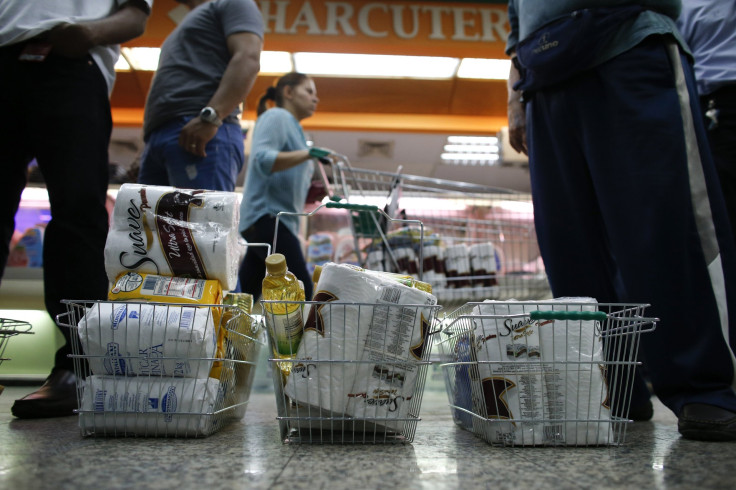7 Weirdest Moments In Latin American News In 2013: Toilet Paper In Venezuela, Mexico's Soda Tax, And Other Wacky News

It has been a busy year in Latin America. From the death of Venezuela President Hugo Chávez, to the naming of the first pope from the region, to the “No to the World Cup” upheaval in Brazil, some of the most powerful stories of the year have come from South and Central America.
Some of them, however, stood out for their ability to make readers go “huh?” Here, in no particular order, are some of Latin America’s wackiest moments of the year.
Venezuela runs out of toilet paper
When do you know your country is in serious trouble? When toilet paper runs out. For Venezuela, that was in May, when the government had to step in and reorganize bathroom supplies. Astonished Venezuelans stayed in line for hours hoping to snatch some toilet paper, while the country’s National Assembly approved $79 million funding to import 39 million rolls. Along with toilet paper, the country also had a serious shortage of sugar, coffee, corn, soap and diapers.
Obama and Castro shake hands
Only a monumental occasion, like the funeral of iconic South African figure Nelson Mandela in December, would bring together President Barack Obama and Cuban leader Raúl Castro, who had never spoken before. The heads of two mutually hostile nations met for the first time while Obama approached the podium to speak, and both leaders shook hands. The move generated much buzz in the media. Some interpreted the move as a sign of better things to come for the countries’ relationship, some condemned it, while others said it was just that: a handshake.
Evo Morales’ plane stopped in Europe
One of the key stories of 2013 was the revelations that the NSA was spying on U.S. citizens, and the whistle-blower was former National Security Agency contractor Edward Snowden. He consequently fled the U.S. and, when he had his American passport revoked, looked for asylum in several countries -- including some in Latin America, particularly Brazil and Ecuador. Venezuela and Bolivia offered refugee status to Snowden, but he never took the offer.
However, there was suspicion on the part of U.S. authorities that Snowden could be smuggled into Bolivia -- to the point that the Bolivian presidential plane was stopped in July when it was flying back to Bolivia from Europe. France did not grant the plane permission to fly through its airspace, so Bolivian President Evo Morales had to make an unplanned stop in Vienna. Austrian authorities searched the plane, supposedly to check that Snowden was not on it. The aircraft resumed its way to Bolivia through Spain’s airspace, but not before several Latin American leaders expressed their outrage for what they called “a violation of international law.”
Snowden, we now know, was nowhere near Morales -- he was in Moscow, and he is in Russia to this day, with a temporary asylum permit that will expire in a few months.
Chilean presidential candidate drops out because of depression
Chile's recent presidential elections brought the return of Socialist Michelle Bachelet, who was the favorite. The conservative party, which suffered the biggest blow of the last two decades when Bachelet won two thirds of the vote, saw its presidential candidate, Pablo Longueira, drop out due to clinical depression. After some internal disagreements, Evelyn Matthei was picked as the conservative candidate, bringing history into the election: Bachelet’s and Matthei’s fathers were both generals, and enemies, during Augusto Pinochet’s dictatorship.
Mexico goes Bloomberg with the soda tax
Mexican President Enrique Peña Nieto’s first year in office has been a busy one. The new administration has drafted a slew of reforms, from energy to education. One of the most talked about was the tax reform, particularly because it aimed to more than just stabilize the economy: It was a tool to fight obesity. Mexico has recently become the world’s leading country by percentage of obese people. The reform introduced a surcharge of onr peso (8 cents of dollar) for every bottle, as well as an 8 percent tax on fast food. Many Mexicans, particularly retailers, bottlers and small businesses, protested the measure and compared it unfavorably to Mayor Michael Bloomberg's ban on large sodas in New York, but the reform passed anyway, in November.
Bolivia no longer a landlocked country! (In Uruguay)
Bolivia has never gotten over losing its sea access after the War of the Pacific in the late 19th century. As the defeated country in the war, together with Peru, it had to give up territory to Chile, which took Bolivia’s former sea coast as south as Antofagasta. Bolivia has been trying to get access to the ocean ever since, and got a minor breakthrough when Peru granted its neighbor the use a few miles of beach in the south of the country. However, Bolivia got an invitation in November to build a waterway through Uruguay that will grant the country access to the Atlantic ocean, which is 1,500 miles from La Paz. The waterway will cross two countries and run through two rivers, and would take around five years to build.
Argentina denies inflation
Argentina has had a hard year economically, but it is not willing to admit it. This year, Argentina’s economy has performed the worst since 1990. Annual GDP growth dropped from 8.9 percent to 2 percent, and inflation has reached, according to independent analysts, a whopping 25 percent. However, the government has never admitted the number, with official agencies saying consumer prices really rose less than 9 percent. President Cristina Fernández went so far as to make fun of the number in a visit to Harvard University in June: “The country would explode if that was true.”
© Copyright IBTimes 2024. All rights reserved.











